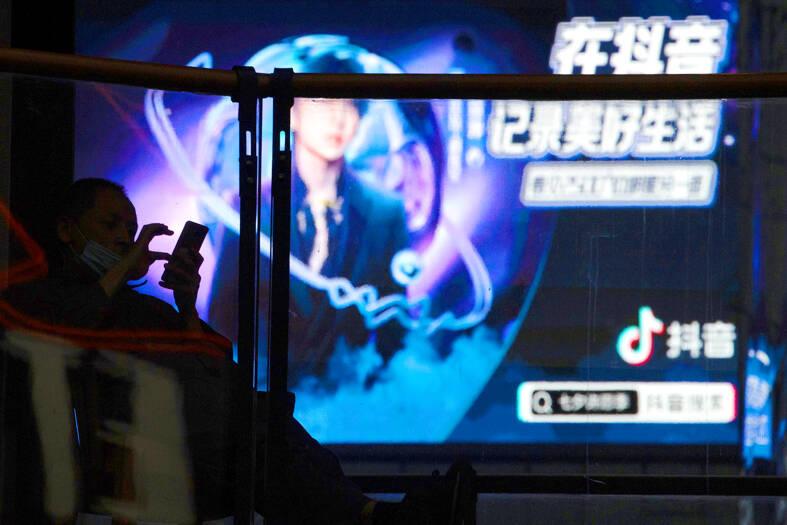Beijing is targeting young Taiwanese voters through Douyin(抖音), an official said yesterday, adding that videos shared on the platform by China aim to sow distrust in Taiwan’s government and military.
China-made videos targeting young Taiwanese have four aims: to incite a sense imminent war if the Democratic Progressive Party (DPP) is re-elected, to vilify Taiwan’s conscription policy, to foster pro-China sentiment and to manipulate attitudes toward key policy issues, the Taiwanese official said.
China’s state-backed Global Times and other Chinese news outlets have recently published a series of reports denigrating the DPP in a bid to generate negative opinions toward the party in Taiwan.

Photo: AP
The reports include edited video from Taiwanese media to present skewed takes on certain issues.
“The Chinese Communist Party [CCP] has defined this election as a choice between ‘war and peace’ and continues to spread the threat of war through China’s state media,” the source said, adding that Beijing aims to push swing voters toward opposition candidates who would foster closer cross-strait ties.
“Pro-China candidates have even echoed these threats, claiming that a vote for the DPP is a vote to send young people to the battlefield. They are cooperating with the CCP to intimidate Taiwanese,” the source said.
The CCP is also attempting to convince young Taiwanese that conscription means they are sacrificing their studies, careers and futures, the source said.
“China basically intends to use cognitive warfare to foster negative views on the policies of the ruling party among young Taiwanese, all with an eye toward affecting the outcome of the election,” they said.
Government employees have been prohibited from using Chinese social media platforms, including Douyin and Tiktok(international version), since 2019.
The Executive Yuan in December last year said there is no legal basis for restricting public use of Douyin and TikTok, adding at the time that it would consult regulations in other countries and stakeholders in Taiwan to determine if there is a need to amend laws.
No concrete progress has been made on that issue, DPP Legislator Lai Jui-lung (賴瑞隆) said yesterday, urging the government to reference laws restricting TikTok in the US and Australia.
Legislating a blanket ban on Douyin and TikTok is difficult, as most users are young people who would oppose such a move, DPP Legislator Liu Shih-fang (劉世芳) said.
Cabinet spokesman Lin Tze-luen (林子倫) was unavailable for comment at press time.
Additional reporting by Hsieh Chun-lin

TRUST: The KMT said it respected the US’ timing and considerations, and hoped it would continue to honor its commitments to helping Taiwan bolster its defenses and deterrence US President Donald Trump is delaying a multibillion-dollar arms sale to Taiwan to ensure his visit to Beijing is successful, a New York Times report said. The weapons sales package has stalled in the US Department of State, the report said, citing US officials it did not identify. The White House has told agencies not to push forward ahead of Trump’s meeting with Chinese President Xi Jinping (習近平), it said. The two last month held a phone call to discuss trade and geopolitical flashpoints ahead of the summit. Xi raised the Taiwan issue and urged the US to handle arms sales to

A magnitude 5.6 earthquake struck off the coast of Yilan County at 12:37pm today, with clear shaking felt across much of northern Taiwan. There were no immediate reports of damage. The epicenter of the quake was 16.9km east-southeast of Yilan County Hall offshore at a depth of 66.8km, Central Weather Administration (CWA) data showed. The maximum intensity registered at a 4 in Yilan County’s Nanao Township (南澳) on Taiwan’s seven-tier scale. Other parts of Yilan, as well as certain areas of Hualien County, Taipei, New Taipei City, Taoyuan, Hsinchu County, Taichung and Miaoli County, recorded intensities of 3. Residents of Yilan County and Taipei received

Taiwan has secured another breakthrough in fruit exports, with jujubes, dragon fruit and lychees approved for shipment to the EU, the Ministry of Agriculture said yesterday. The Animal and Plant Health Inspection Agency on Thursday received formal notification of the approval from the EU, the ministry said, adding that the decision was expected to expand Taiwanese fruit producers’ access to high-end European markets. Taiwan exported 126 tonnes of lychees last year, valued at US$1.48 million, with Japan accounting for 102 tonnes. Other export destinations included New Zealand, Hong Kong, the US and Australia, ministry data showed. Jujube exports totaled 103 tonnes, valued at

BIG SPENDERS: Foreign investors bought the most Taiwan equities since 2005, signaling confidence that an AI boom would continue to benefit chipmakers Taiwan Semiconductor Manufacturing Co’s (TSMC, 台積電) market capitalization swelled to US$2 trillion for the first time following a 4.25 percent rally in its American depositary receipts (ADR) overnight, putting the world’s biggest contract chipmaker sixth on the list of the world’s biggest companies by market capitalization, just behind Amazon.com Inc. The site CompaniesMarketcap.com ranked TSMC ahead of Saudi Aramco and Meta Platforms Inc. The Taiwanese company’s ADRs on Tuesday surged to US$385.75 on the New York Stock Exchange, as strong demand for artificial intelligence (AI) applications led to chip supply constraints and boost revenue growth to record-breaking levels. Each TSMC ADR represents